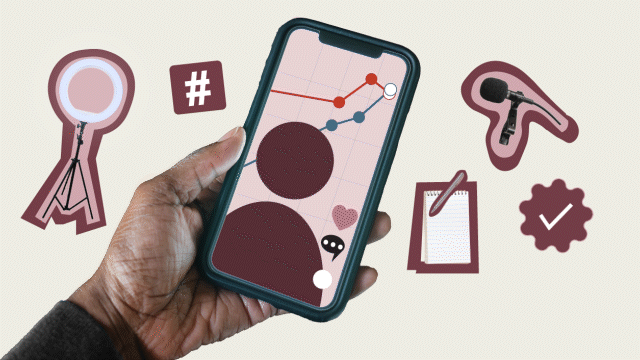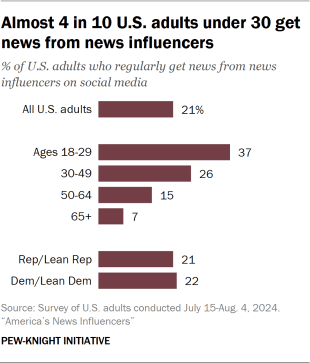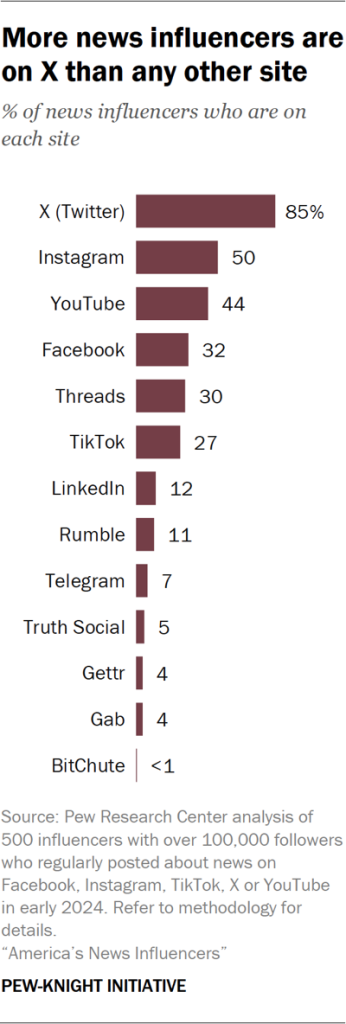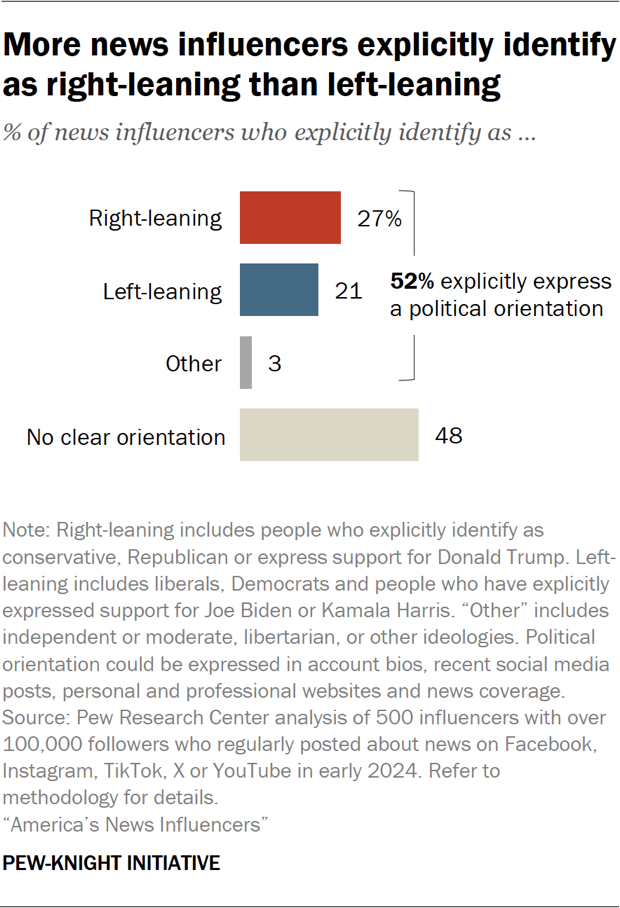- REPORT
|
America’s News Influencers
The creators and consumers in the world of news and information on social media

In the heat of the 2024 election, news influencers seemed to be everywhere. Both Republicans and Democrats credentialed content creators to cover their conventions – and encouraged influencers to share their political messages. Influencers also interviewed the candidates and held fundraisers for them.
What is a news influencer?
In this study, we use the term “news influencers” to refer to individuals who regularly post about current events and civic issues on social media and have at least 100,000 followers on any of Facebook, Instagram, TikTok, X (formerly Twitter) or YouTube. News influencers can be journalists who are or were affiliated with a news organization or independent content creators, but they must be people and not organizations.
Refer to the methodology for more about how we identified news influencers.
But up until now, it has been difficult to get a sense of the size and characteristics of this new wave of news providers.
A unique Pew Research Center study provides a deeper understanding of both the makeup of the news influencer universe and its audience. The project includes an in-depth examination of a sample of 500 popular news influencers and the content they produce, derived from a review of more than 28,000 social media accounts. We also conducted a nationally representative survey of Americans to better understand who regularly gets news from news influencers.
Key findings about news influencers
- About one-in-five Americans – including a much higher share of adults under 30 (37%) – say they regularly get news from influencers on social media.
- News influencers are most likely to be found on the social media site X, where 85% have a presence. But many also are on other social media sites, such as Instagram (where 50% have an account) and YouTube (44%).
- Slightly more news influencers explicitly identify as Republican, conservative or pro-Donald Trump (27% of news influencers) than Democratic, liberal or pro-Kamala Harris (21%).
- A clear majority of news influencers are men (63%).
- Most (77%) have no affiliation or background with a news organization.
How many Americans get news from influencers, and what is their experience?

- About one-in-five U.S. adults (21%) say they regularly get news from news influencers on social media, according to a survey of 10,658 Americans conducted in summer 2024. This is especially common among younger adults: 37% of those ages 18 to 29 say they regularly get news from influencers. But there are minimal differences between Republicans and Democrats on this question.
- Among Americans who get news from news influencers on social media, most (65%) say news influencers have helped them better understand current events and civic issues. And seven-in-ten say the news they get from news influencers is at least somewhat different from the news they get from other sources. Far fewer (31%) say they feel a personal connection to a news influencer.
- These Americans also say they get a variety of different types of information, from basic facts and opinions to funny posts and breaking news. When it comes to opinions, most who see them say they are an even mix of opinions they agree and disagree with (61%), but far more say they mostly agree with what they see (30%) than mostly disagree (2%).
Jump to more findings from the survey of U.S. adults, or a broader analysis of Americans’ news habits on social media.
Most news influencers are on multiple sites, but X is the most common

- Far more of the news influencers in our study have an account on X than any other social media site: 85% are on the site, compared with 50% who are on Instagram, the next-most popular site.
- At the same time, it is common for influencers to have a cross-site presence to maximize their audience. About two-thirds of news influencers in the study are on more than one site, including 27% who are on five or more sites.
- Many influencers also share content through podcasts (34%) or newsletters (22%). And across sites, a majority of news influencers (59%) monetize their online presence in some way, whether through subscriptions, donations or merchandise sales.
Jump to more basic details about where news influencers are posting.
more explicitly identify as right-leaning than left-leaning

- Among the news influencers in our sample, men outnumber women by a roughly two-to-one margin: 63% of influencers are men, compared with 30% who are women. (The remainder either are nonbinary or their gender could not be determined by researchers.)
- Many Republicans have long believed that social media sites censor conservative viewpoints. But overall, more news influencers explicitly present a politically right-leaning orientation than a left-leaning one (27% vs. 21%) in their account bios, posts, websites or media coverage. About half of influencers do not express any clear political orientation. Influencers on Facebook are particularly likely to prominently express right-leaning views: There are three times as many explicitly conservative news influencers (39%) as liberal ones (13%) on the site.
- Nearly one-in-five news influencers (18%) share part of their identity or beliefs beyond their political orientation, such as expressing support for a specific political cause or value through words, images or emojis on their account page. Among the most common expressions are LGBTQ+ identity or support (6%) or being pro-Palestinian (5%).
Jump to more information on the personal characteristics of news influencers.

.png)


No comments:
Post a Comment